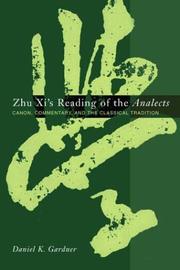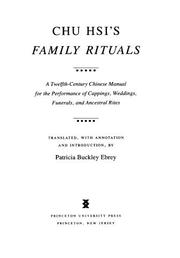| Listing 1 - 10 of 20 | << page >> |
Sort by
|
Book
Abstract | Keywords | Export | Availability | Bookmark
 Loading...
Loading...Choose an application
- Reference Manager
- EndNote
- RefWorks (Direct export to RefWorks)
Book
ISBN: 9782842794040 2842794044 Year: 2008 Publisher: Paris : You-Feng,
Abstract | Keywords | Export | Availability | Bookmark
 Loading...
Loading...Choose an application
- Reference Manager
- EndNote
- RefWorks (Direct export to RefWorks)
China --- Chine --- History --- Histoire --- S12/0433 --- S12/0430 --- China: Philosophy and Classics--Zhu Xi --- China: Philosophy and Classics--Neo-Confucianists: general and Song (including lixue 理學)
Book
ISBN: 9782251100159 2251100156 Year: 2013 Publisher: Paris : Les Belles lettres,
Abstract | Keywords | Export | Availability | Bookmark
 Loading...
Loading...Choose an application
- Reference Manager
- EndNote
- RefWorks (Direct export to RefWorks)
Rédigé en 1188 par le philosophe néoconfucéen Zhu Xi (1130-1200), ce mémoire confidentiel destiné à l'empereur Xiaozong dresse un implacable réquisitoire face à la corruption et l’incurie du système politique de son époque, et propose la mise en œuvre de réformes visant à corriger les institutions et à redresser le pays. Partisan d’un confucianisme rénové, Zhu Xi estime que seul le ralliement de l’empereur aux idées contenues dans les classiques, dont La Grande Étude constitue le texte fondamental, permettra de remettre le pays sur la bonne voie. Fidèle à la tradition confucianiste d’engagement au service de l’État et de la société, Zhu Xi développe une argumentation politique où ses idées philosophiques apparaissent en filigrane, mettant en œuvre ce « courage de la vérité » analysé par Michel Foucault. Rédigé dans le style sobre et élégant des lettrés, le Mémoire scellé sur la situation de l’Empire de 1188 offre une véritable leçon de confucianisme appliqué au gouvernement de l’Empire.
Political corruption --- Neo-Confucianism --- Corruption (Politique) --- Néo-confucianisme --- Early works to 1800 --- Ouvrages avant 1800 --- China --- Chine --- Politics and government --- History --- Politique et gouvernement --- Histoire --- S12/0433 --- China: Philosophy and Classics--Zhu Xi --- Néo-confucianisme --- Early works to 1800.
Book
ISBN: 9782251100104 2251100105 Year: 2012 Volume: 9 Publisher: Paris: Les Belles Lettres,
Abstract | Keywords | Export | Availability | Bookmark
 Loading...
Loading...Choose an application
- Reference Manager
- EndNote
- RefWorks (Direct export to RefWorks)
De toutes les controverses qui jalonnent l'histoire de la pensée chinoise, la « Querelle de Zhu Xi et Lu Jiuyuan » est sans doute l'une des plus marquantes et assurément la plus célèbre pour ce qui concerne l'époque impériale. L'épisode met aux prises deux penseurs considérables, à la fois lettrés exemplaires et figures majeures du renouveau confucéen des Song (960-1279), dont la rivalité de chefs d'école culmine à la fin des années 1180 au cours de l'échange de lettres présenté dans ce volume. Si l'affrontement se focalise sur la question du « Faîte suprême » (Taiji), notion métaphysique associée au Yin-Yang dont la reformulation par Zhu Xi est contestée par Lu Jiuyuan, le débat touche également à des conceptions divergentes de la lignée confucéenne, tout en révélant des approches sensiblement différentes de l'herméneutique et de la pratique lettrées.Diffusé dès son époque dans les cercles de disciples, puis médité par des générations de lettrés, cet ensemble épistolaire nous est donné ici à lire pour la première fois en français, dans une traduction intégrale qui en restitue la dynamique et la teneur, entre estime réciproque et critiques incisives. On y accède de plain-pied à ce que pouvait être un débat philosophique dans la Chine prémoderne : une forme de sociabilité raffinée, où le questionnement sur la réalité ultime est inséparable d'un art de lire les textes, et où l'ascendant intellectuel se conquiert aussi bien dans le jeu de l'argumentation que dans l'affirmation de styles d'études antagoniques.
Book
ISBN: 2204022810 9782204022811 Year: 1984 Publisher: Paris: Les Éditions du Cerf,
Abstract | Keywords | Export | Availability | Bookmark
 Loading...
Loading...Choose an application
- Reference Manager
- EndNote
- RefWorks (Direct export to RefWorks)

ISBN: 1282871870 9786612871870 023150280X 9780231502801 9780231128643 0231128649 9780231128650 0231128657 Year: 2003 Publisher: New York: Columbia university press,
Abstract | Keywords | Export | Availability | Bookmark
 Loading...
Loading...Choose an application
- Reference Manager
- EndNote
- RefWorks (Direct export to RefWorks)
A pioneering study of Zhu Xi's reading of the Analects, this book demonstrates how commentary is both informed by a text and informs future readings, and highlights the importance of interlinear commentary as a genre in Chinese philosophy.
Neo-Confucianism. --- Confucianism --- Philosophy, Chinese --- Confucius. --- Zhu, Xi, --- Confucius --- Confucius. - Lun yu. --- Zhu, Xi, - 1130-1200. - Lun yu ji zhu. --- Neo-Confucianism --- S12/0363 --- S12/0433 --- China: Philosophy and Classics--Lunyu 論語 Analects --- China: Philosophy and Classics--Zhu Xi
Book
ISBN: 9622012744 Year: 1983 Publisher: Hong Kong : The Chinese university press,
Abstract | Keywords | Export | Availability | Bookmark
 Loading...
Loading...Choose an application
- Reference Manager
- EndNote
- RefWorks (Direct export to RefWorks)
S12/0430 --- S12/0450 --- S12/0433 --- Neo-Confucianism --- -#SML: Joseph Spae --- Confucianism --- Philosophy, Chinese --- China: Philosophy and Classics--Neo-Confucianists: general and Song (including lixue 理學) --- China: Philosophy and Classics--Ming, Qing: later Confucian teachings, Sacred Edicts (incl. Wang Fuzhi, Yan Yuan, Li Kong, Dai Dongyuan) --- China: Philosophy and Classics--Zhu Xi --- #SML: Joseph Spae

ISBN: 0691031495 1322019568 1400861950 0691605289 0691634262 9780691031491 Year: 1991 Publisher: Princeton (N.J.) : Princeton university press,
Abstract | Keywords | Export | Availability | Bookmark
 Loading...
Loading...Choose an application
- Reference Manager
- EndNote
- RefWorks (Direct export to RefWorks)
Compiled by the great Neo-Confucian philosopher Chu Hsi (1130-1200), the Family Rituals is a manual for the private performance of the standard Chinese family rituals: initiations, weddings, funerals, and sacrifices to ancestral spirits. This translation makes the work, which is the most important text of its kind in the last thousand years of Chinese history, fully accessible to scholars and students in a wide range of fields. The militantly Confucian Family Rituals was designed to combat the practices of Buddhist and other non-Confucian rites, and it was quickly recognized as the standard authority by the state, the educated elite, and even by many uneducated commoners. With the spread of Neo-Confucianism, it was honored also in Vietnam, Korea, and Japan. Patricia Buckley Ebrey has added notes showing how the Family Rituals enhances our understanding of Chinese society and culture. She cites many of the commentaries on the work to give a sense of its uses in the centuries after its publication.Originally published in 1991.The Princeton Legacy Library uses the latest print-on-demand technology to again make available previously out-of-print books from the distinguished backlist of Princeton University Press. These editions preserve the original texts of these important books while presenting them in durable paperback and hardcover editions. The goal of the Princeton Legacy Library is to vastly increase access to the rich scholarly heritage found in the thousands of books published by Princeton University Press since its founding in 1905.
S11/0600 --- S12/0433 --- S13A/0410 --- China: Social sciences--Customs, etiquette --- China: Philosophy and Classics--Zhu Xi --- China: Religion--Death, funeral, ancestral worship --- -S11/0600 --- Rites and ceremonies --- #SML: Chinese memorial library --- S11/0610 --- S11/0700 --- China: Social sciences--Marriage --- China: Social sciences--Clan and family: general and before 1949 (incl. names, clan rules) --- China --- Social life and customs --- Rites and ceremonies - China.
Book
ISBN: 0312134703 Year: 1987 Publisher: Hong Kong Chinese university press
Abstract | Keywords | Export | Availability | Bookmark
 Loading...
Loading...Choose an application
- Reference Manager
- EndNote
- RefWorks (Direct export to RefWorks)
S12/0433 --- Philosophers --- -Scholars --- China: Philosophy and Classics--Zhu Xi --- Zhu, Xi --- Zhu, Xi, --- -China: Philosophy and Classics--Zhu Xi --- Chu, Hsi --- Chu, Jih-hsi --- Zhu, Rixi --- 朱希 --- 朱喜 --- 朱洗 --- 朱溪 --- 朱旭 --- 朱曦 --- 朱晞 --- 朱禧 --- 朱玺 --- 朱璽 --- 朱熹 --- 朱西 --- 朱錫 --- 朱锡 --- 竹西 --- Chu, Hsi, --- C̄ū, Hī, --- Chu, Hi, --- Choo, He, --- Tschu, Hi, --- Shu, Ki, --- Chu, Hy, --- Tchou, Hi, --- Chu, Hũi, --- Tchu-hi, --- 朱熹, --- Zhu, Fuzi, --- Chu, Fu-tzu, --- Choo-Foo-Tze, --- Choo-foo-tsze, --- Chu, Puja, --- 朱夫子, --- Zhu, Zi, --- Chu, Tzu, --- Zhuzi, --- Chu-tzu, --- Chuja, --- Shu-shi, --- Shushi, --- 朱子, --- Zhu, Yuanhui, --- Chu, Yüan-hui, --- 朱元晦, --- Zhu, Zhonghui, --- Chu, Chung-hui, --- 朱仲晦, --- Zhu, Hui'an, --- Chu, Hui-an, --- 朱晦庵, --- Zhu, Huiweng, --- Chu, Hui-weng, --- 朱晦翁, --- Zhu, Dunweng, --- Chu, Tun-weng, --- 朱遯翁, --- Yungulaoren, --- Yün-ku-lao-jen, --- 云谷老人, --- Cangzhoubingsou, --- Tsʻang-chou-ping-sou, --- 沧洲病叟, --- Zhu, Ziyang, --- Chu, Tzu-yang, --- 朱紫陽, --- 朱紫阳, --- C̄ū, Hī --- Chu, Hi --- Choo, He --- Tschu, Hi --- Shu, Ki --- Chu, Hy --- Tchou, Hi --- Chu, Hũi --- Tchu-hi
Book
ISBN: 9781438458380 9781438458373 9781438458397 1438458398 1438458371 Year: 2015 Publisher: Albany
Abstract | Keywords | Export | Availability | Bookmark
 Loading...
Loading...Choose an application
- Reference Manager
- EndNote
- RefWorks (Direct export to RefWorks)
Zhu Xi (1130–1200), the chief architect of neo-Confucian thought, affected a momentous transformation in Chinese philosophy. His ideas came to dominate Chinese intellectual life, including the educational and civil service systems, for centuries. Despite his influence, Zhu Xi is known as the "great synthesizer" and rarely appreciated as a thinker in his own right. This volume presents Zhu Xi as a major world philosopher, one who brings metaphysics and cosmology into attunement with ethical and social practice. Contributors from the English- and Chinese-speaking worlds explore Zhu Xi's unique thought and offer it to the Western philosophical imagination. Zhu Xi's vision is critical, intellectually rigorous, and religious, telling us how to live in the transforming world of li—the emergent, immanent, and coherent patternings of natural and human milieu.
Zhu, Xi, --- S12/0433 --- China: Philosophy and Classics--Zhu Xi. --- China: Philosophy and Classics--Zhu Xi --- Chu, Hsi, --- C̄ū, Hī, --- Chu, Hi, --- Choo, He, --- Tschu, Hi, --- Shu, Ki, --- Chu, Hy, --- Tchou, Hi, --- Chu, Hũi, --- Tchu-hi, --- 朱熹, --- Zhu, Fuzi, --- Chu, Fu-tzu, --- Choo-Foo-Tze, --- Choo-foo-tsze, --- Chu, Puja, --- 朱夫子, --- Zhu, Zi, --- Chu, Tzu, --- Zhuzi, --- Chu-tzu, --- Chuja, --- Shu-shi, --- Shushi, --- 朱子, --- Zhu, Yuanhui, --- Chu, Yüan-hui, --- 朱元晦, --- Zhu, Zhonghui, --- Chu, Chung-hui, --- 朱仲晦, --- Zhu, Hui'an, --- Chu, Hui-an, --- 朱晦庵, --- Zhu, Huiweng, --- Chu, Hui-weng, --- 朱晦翁, --- Zhu, Dunweng, --- Chu, Tun-weng, --- 朱遯翁, --- Yungulaoren, --- Yün-ku-lao-jen, --- 云谷老人, --- Cangzhoubingsou, --- Tsʻang-chou-ping-sou, --- 沧洲病叟, --- Zhu, Ziyang, --- Chu, Tzu-yang, --- 朱紫陽, --- 朱紫阳, --- Chu, Hsi --- C̄ū, Hī --- Chu, Hi --- Choo, He --- Tschu, Hi --- Shu, Ki --- Chu, Hy --- Tchou, Hi --- Chu, Hũi --- Tchu-hi --- 朱熹 --- Zhu, Xi, 1130-1200.
| Listing 1 - 10 of 20 | << page >> |
Sort by
|

 Search
Search Feedback
Feedback About UniCat
About UniCat  Help
Help News
News